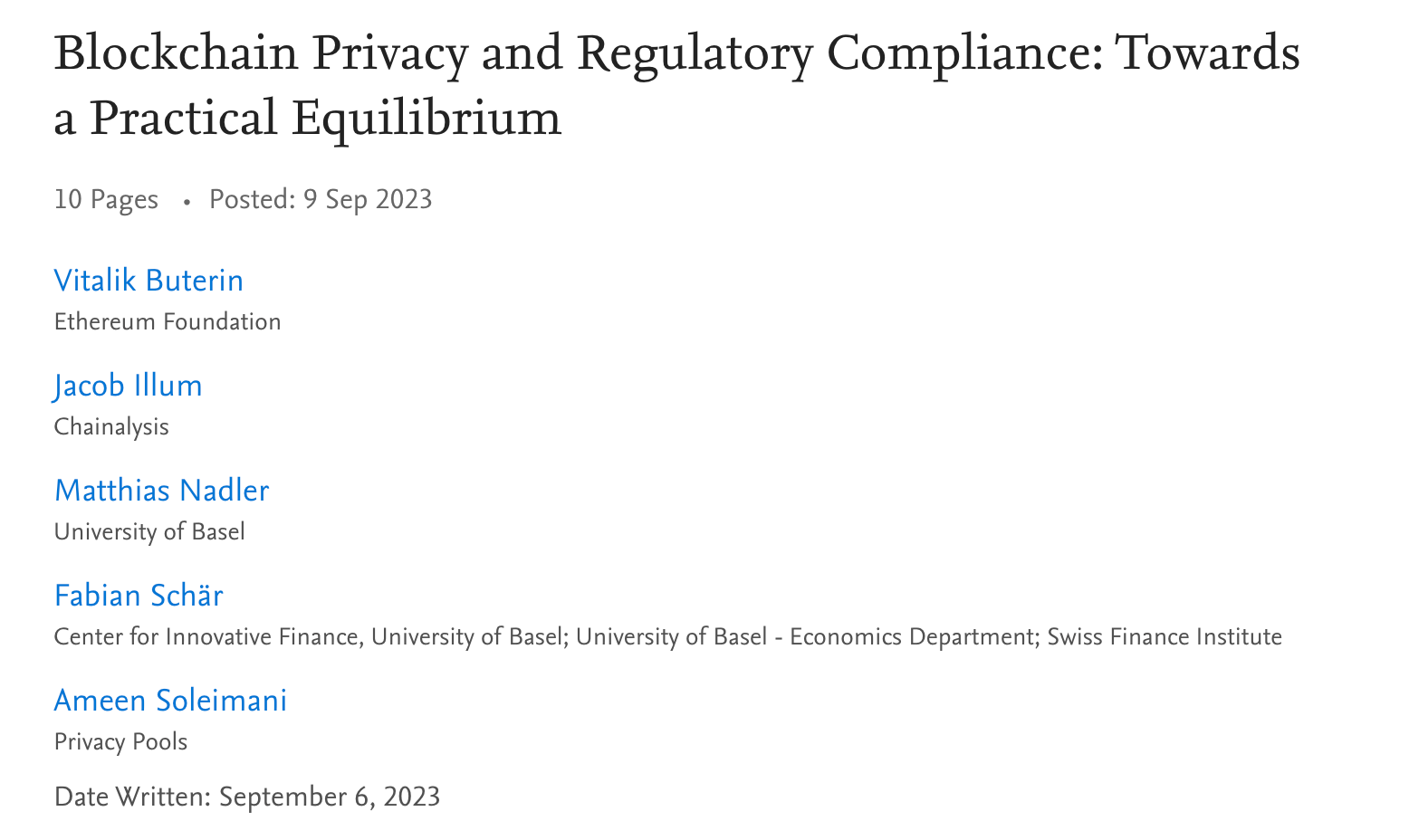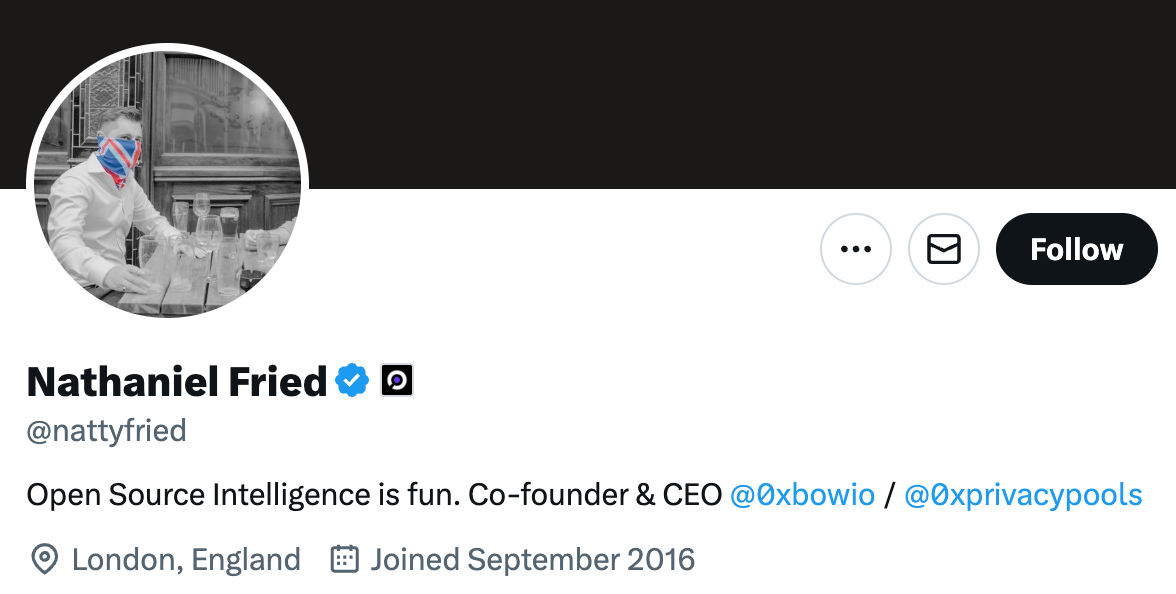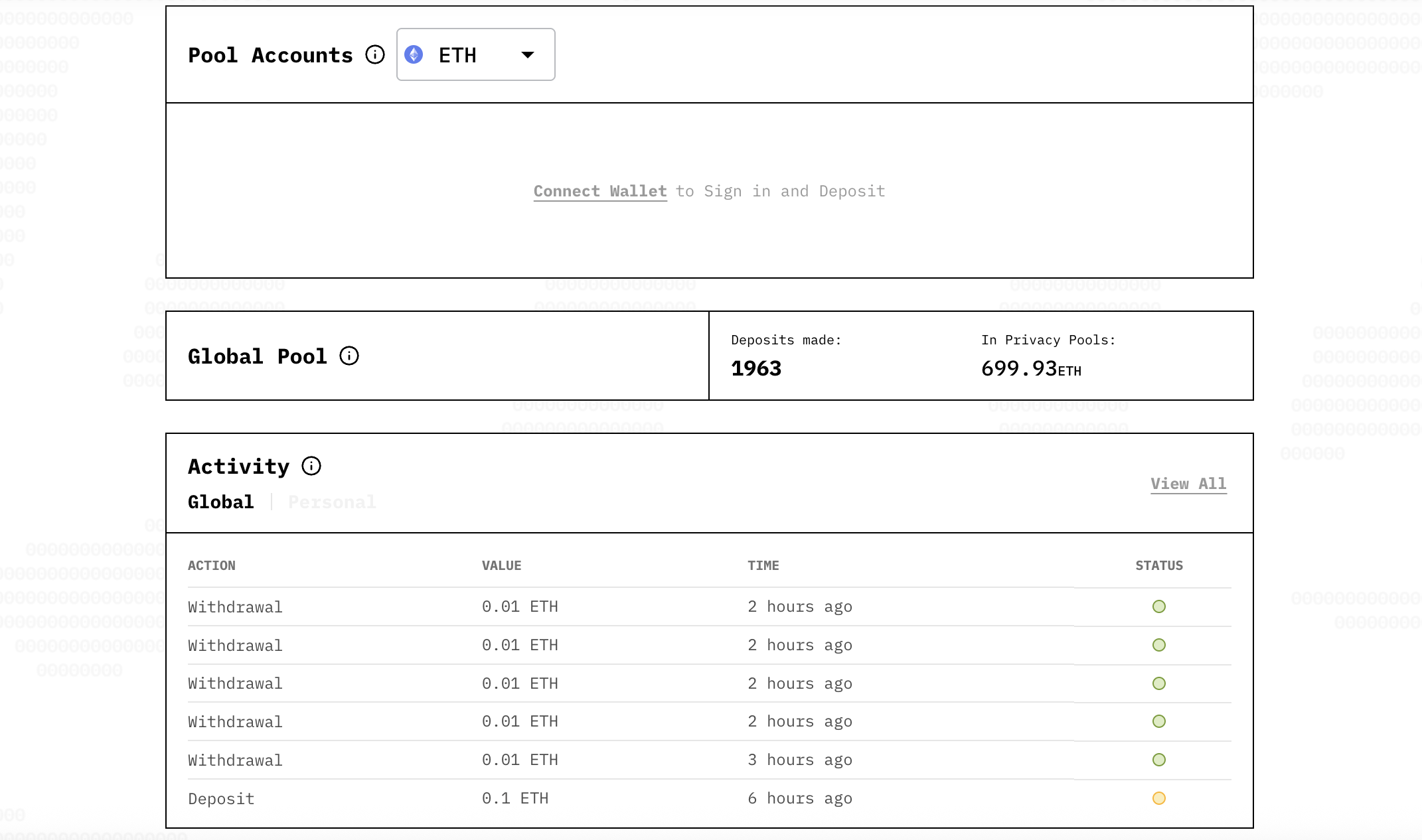撰文:Eric,Foresight News
11 月 18 日,Privacy Pools(隐私池)开发团队 0xbow 宣布完成了 350 万美元融资,本轮融资由 Starbloom Capital 领投,Coinbase Ventures、BOOST VC 等风投机构以及前 Coinbase CTO Balaji Srinivasan 等多位天使投资人参投。
Privacy Pools 是以太坊基金会 Kohaku 计划的核心组件,本身旨在合规的前提下实现资金转移的隐私性。Privacy Pools 基于 Vitalik Buterin 参与撰写的关于关联集的研究开发,而关联集简单来说就是一个隐私协议的「防作弊器」,防止图谋不轨的人利用隐私协议进行混币操作,同时还能监控可疑活动。
Privacy Pools 又是一个 To VB(Vitalik Buterin)创业项目的典型案例。隐私的话题早在 Zcash 诞生之时就成为了 Web3 行业逃不开的话题,但零知识证明(ZKP)技术的发展和支持合规终于让隐私从纸上谈兵来到了产品化阶段。
Privacy Pools 是什么?
据文档介绍,Privacy Pools 通过 ZKP 和承诺机制相结合的方式实现隐私交易。用户可以将资产存入隐私池,之后可进行部分或全部提取,无需在存款地址和提现地址之间创建链上的关系。该协议使用关联集提供者(ASP)来维护一组被批准的存款,从而防止黑钱进入系统以确保符合监管要求。
听起来好像和 Tornado Cash 差不多,实际上也确实差不多,区别点在于 Privacy Pools 原生地实现了合规机制。
Tornado Cash 在被疯狂诟病为黑客提供洗钱工具之后推出了一个「合规工具」,该工具可以在将资金从 Tornado Cash 转入交易所时提供一个 ZKP,证明自己的资金来自一个合法合规的地址,而不是与黑客有关联的地址,但这在很大程度上削弱了隐私的程度。
Privacy Pool 提供了一个在隐私层面上更优的方案,也就是上文所说的「关联集」。关联集是一个人工维护的列表,用户在向 Privacy Pool 存入资金时,协议会将存款的信息加入「允许列表」中,未来提款时通过 ZKP 证明与协议支持的存款地址间的关系就可以进行提款。
当用户向 Privacy Pool 存款时需要通过 ZKP 提交一个上文提及的「承诺」,承诺资金来源是合规的,之后关联集将存款信息加入列表。未来提款时,再通过 ZKP 证明提款地址与某个存款地址之间的联系后实现提款。
这中间存在的问题就是关联集仍然可能因为审查的信息落后而误接受了非法资金,而「人工维护」就在此时发挥了作用,在非法资金进入资金池后,关联集仍然可以人为将不合规的地址排除出允许列表之外。
对于这样的情况,Privacy Pool 设计了「Ragequit」功能,让资金在被禁止用其他地址提取后,可以退回原本的存款地址中。
两名以太坊元老坐镇
0xbow 由 Ameen Soleimani、Nathaniel Fried 和 Zak Cole 共同创立。虽然 Privacy Pool 今年 3 月才刚刚上线主网,但关联集的论文实际在 2023 年 9 月时候已经发表,从概念验证到实际落地经历了一年半的时间。

三名联创中有两名都是以太坊生态的「老兵」。CTO Ameen Soleimani 曾早在 2016 年就在 ConsenSys 主导状态通道的研究,离职后先后作为核心人员参与了旨在支持以太坊公共产品的非盈利组织 MolochDAO、稳定币 RAI 的发行商 Reflexer Finance 以及为伊朗提供人道主义援助的 DAO IranUnchained。
Zak Cole 的履历则更加丰富,2018 年就担任了推动以太坊技术在企业端应用的 Enterprise Ethereum Alliance(EEA)主席,之后参与了包括 Whiteblock、Syscoin、DeFi Pulse、Slingshot、Code4rena 在内的诸多项目。

Nathaniel Fried 相对没有前两位那么资深,其在 0xbow 之前曾在专注于国家安全的 Blacklake 和英国的开源情报公司以及非盈利组织工作。Nathaniel Fried X 账号的介绍中也表达了对开源情报的浓厚兴趣。
据 The Block 报道,在本轮融资前,0xbow 就获得了来自 Bankless、Number Group(Zak Cole 任联创兼 CEO)、Public Works 以及 Frax 创始人 Sam Kazemian 和主导 Metamask 开发的 Dan Finlay 等的投资。
以太坊的 Kohaku 隐私大计
Vitalik 于日前的阿根廷举办的以太坊开发者大会上展示了面向以太坊的隐私工具框架 Kohaku,我们在《V 神「不可作恶」路线图:隐私在以太坊叙事中的新位置》中简单总结了 Vitalik 的计划。
简单来说,Kohaku 试把 Privacy Pools、Railgun 等协议打包成可组合的模块,未来还计划扩展到网络层匿名和基于零知识证明的浏览器等方向。与之配套,基金会内部组建了由数十名研究员和工程师组成的 Privacy Cluster,并将原有的 Privacy & Scaling Explorations 团队更名为「Privacy Stewards of Ethereum」,从探索新技术转向围绕隐私投票、匿名 DeFi 等具体场景推进工程落地。未来的以太坊,更接近于「透明结算层+可编程隐私层」的组合,而非在完全公开与完全黑盒之间做简单摇摆。
Kohaku 并非是一个单独的产品,而是旨在成为一个可以被钱包等集成的套件。例如 Metamask 集成 Kohaku 后,如果想要实现匿名转账,就可以在后端通过 Privacy Pools 实现。
对用户而言,0xbow 作为一款隐私工具更胜于刷空投的目标。尤其是对于一些资金体量比较大的用户,如果在钱包私钥因为复制等操作频繁而缺乏安全性的情况下,可以利用该协议安全的将资金转移到新的地址中。但该协议也存在一些底层逻辑上的漏洞:对于大户而言,如果取出的资金较大,则就自动将存款金额较小的地址排除出了关联之外。

举例来说,如果现在池子里有 10 个人存款,9 人存款金额都小于 1 ETH,1 人存入了 100 ETH,那么这个大户单次存款金额超过 1 ETH 或者提款次数过多都会导致地址之间的关联很容易被追踪,建议用户在使用时关注池子中资金的总量与其他用户存款的额度避免想要提高隐私性的举动反而增加了其他人了解你的证据。
免责声明:本文章仅代表作者个人观点,不代表本平台的立场和观点。本文章仅供信息分享,不构成对任何人的任何投资建议。用户与作者之间的任何争议,与本平台无关。如网页中刊载的文章或图片涉及侵权,请提供相关的权利证明和身份证明发送邮件到support@aicoin.com,本平台相关工作人员将会进行核查。



